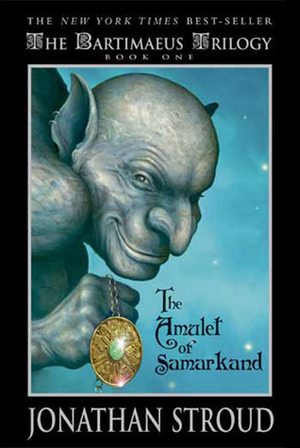Find a Review
Book reviews from Robin, co-host of the Books That Burn podcast. Bookshop links are affiliate links, we may receive a small commission if you purchase from our Bookshop. This content is CAN credentialed, which means you can report instances of harassment, abuse, or other harm on their hotline at (617) 249-4255, or on their website at creatoraccountabilitynetwork.org.
Featured
- Get link
- X
- Other Apps
The Amulet of Samarkand by Jonathan Stroud (Bartimaeus #1)
Nathaniel is a boy magician-in-training, sold to the government by his birth parents at the age of five and sent to live as an apprentice to a master. Powerful magicians rule Britain, and its empire, and Nathaniel is told his is the "ultimate sacrifice" for a "noble destiny."
If leaving his parents and erasing his past life isn't tough enough, Nathaniel's master, Arthur Underwood, is a cold, condescending, and cruel middle-ranking magician in the Ministry of Internal Affairs. The boy's only saving grace is the master's wife, Martha Underwood, who shows him genuine affection that he rewards with fierce devotion. Nathaniel gets along tolerably well over the years in the Underwood household until the summer before his eleventh birthday. Everything changes when he is publicly humiliated by the ruthless magician Simon Lovelace and betrayed by his cowardly master who does not defend him.
Nathaniel vows revenge. In a Faustian fever, he devours magical texts and hones his magic skills, all the while trying to appear subservient to his master. When he musters the strength to summon the 5,000-year-old djinni Bartimaeus to avenge Lovelace by stealing the powerful Amulet of Samarkand, the boy magician plunges into a situation more dangerous and deadly than anything he could ever imagine.
TITLE: The Amulet of Samarkand
AUTHOR: Jonathan Stroud with Simon Jones (Narrator)
PUBLISHER: Listening Library
YEAR: 2003
LENGTH: 462 pages (13 hours 30 minutes)
AGE: Middle Grade, Young Adult
GENRE: Fantasy
RECOMMENDED: Yes
Queer Rep Summary: No canon queer rep.
Bartimaeus is a djinni, enslaved by apprentice magician Nathaniel for the purpose of revenge against a magician who bullied him. When it turns out that the titular amulet is more than just a valuable possession, Nathaniel and Bartimaeus find themselves tangled in a plot against the government itself.
The worldbuilding makes it clear that magicians have been around for a very long time, with Nathaniel’s home of London being merely the most recent epicenter of magic and magical power. It shows the classism and social stratification which is fueled and perpetuated by magicians through their enslavement of summoned entities. It’s also a system which relies on controlling and conditioning children to think of being a magician and growing up to serve the British government as the only good and worthwhile way to exist, fostering a deep loathing and contempt for commoners (non-magicians). Bartimaeus never lets it be forgotten that his very corporeal existence is an unwanted and physically painful condition of his slavery, that as much as he may or may not develop a rapport with Nathaniel, their relationship is an inherently unequal one which is predicated on Nathaniel summoning Bartimaeus against his will. He's is a witty and engaging narrator, with timely asides to explain various worldbuilding details in a sardonic manner. The narrative alternates between Bartimaeus’s commentary and a third-person view of Nathaniel’s perspective in the past and present.
This is a solid start to the trilogy, setting up things which the later books will build upon.
Graphic/Explicit CW for classism, child abuse.
Moderate CW for fire/fire injury, emotional abuse, physical abuse, violence, slavery, torture, murder, death.
Minor CW for ableism, deadnaming, blood.
- Get link
- X
- Other Apps
Popular Posts
The Rise and Fall of Snow: Why the Hunger Games prequel is good, actually
- Get link
- X
- Other Apps
When Miserable People Get Happy Endings: "Unlikeable" Protagonists in Alexis Hall's Writing
- Get link
- X
- Other Apps

Comments
Post a Comment